Key takeaways:
- Failures are learning opportunities: Each failed experiment provides valuable insights that guide future projects.
- Importance of collaboration: Sharing experiences and seeking feedback from peers enhances understanding and fosters innovative solutions.
- Embracing uncertainty: Accepting discomfort and the unknown can lead to unexpected breakthroughs and growth.
- Documenting challenges: Writing down lessons learned transforms disappointment into productive reflection and informed decision-making.
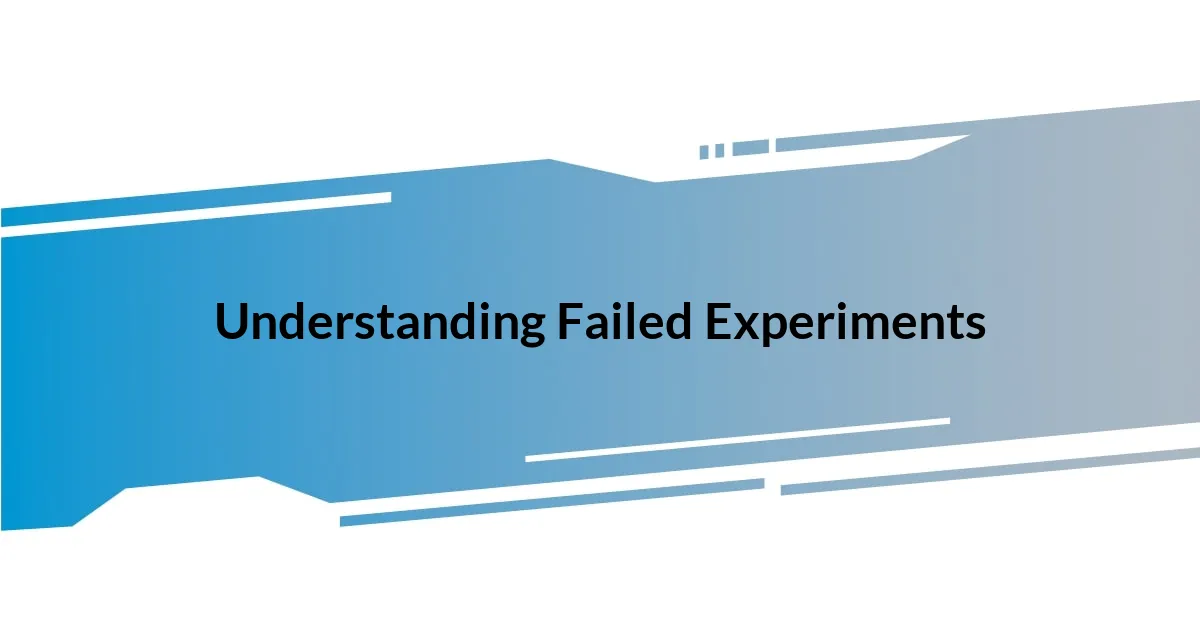
Understanding Failed Experiments
Understanding failed experiments can often be disheartening, but I’ve learned that each failure carries lessons worth embracing. I remember a time when my prototype completely malfunctioned during a critical test. It felt like the ground had slipped from under me, but that setback pushed me to analyze the process more rigorously and avoid jumping to conclusions too quickly.
When I reflect on my own experiences, I see failures as signposts rather than dead ends. Have you ever felt compelled to scrap a project only to realize that seemingly random failures were guiding you toward a crucial breakthrough? I’ll never forget the moment I tweaked my approach after an embarrassing miscalculation—it led me to a much more refined solution that I wouldn’t have considered otherwise.
Each failed experiment invites us to dig deeper and question our assumptions. For instance, after a particularly tough setback, I found myself jotting down everything I learned from the mishap. What did I misjudge, overlook, or misunderstand? This written reflection became a powerful tool for me, transforming disappointment into deliberate decision-making in future projects.
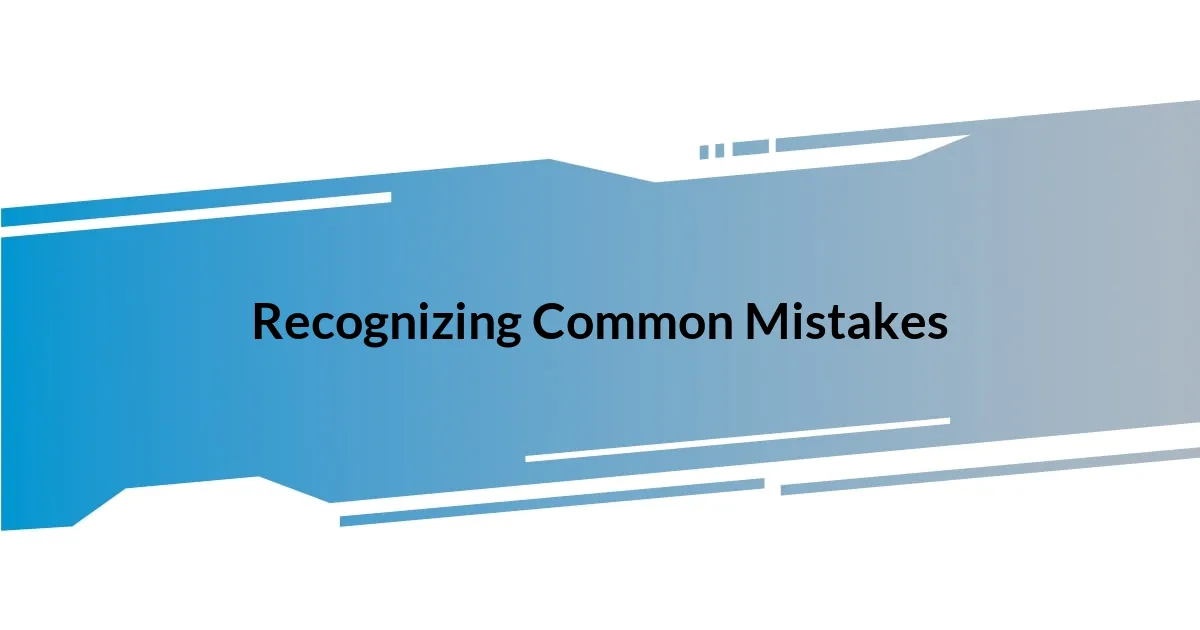
Recognizing Common Mistakes
Recognizing mistakes in experiments often begins with a moment of honest reflection. I vividly remember a situation where I failed to properly document my experiment’s parameters. The result? A lot of time wasted trying to replicate a result that never had a solid foundation. In hindsight, it taught me the importance of meticulous record-keeping. Have you ever found yourself in a similar position, wondering how you ended up with inconsistent results?
It’s crucial to pay attention to recurring slip-ups. In one of my projects, I realized I consistently overlooked the sourcing of my materials. Each time I repeated this mistake, I found myself facing unexpected variables that skewed my results. This experience highlighted that understanding the source can offer critical insights. We often focus on the process, but aren’t the inputs equally important?
Mistakes also serve as valuable indicators of our gaps in knowledge. I can’t forget the time I neglected to seek feedback from peers before finalizing my experiment. The outcomes were far from what I expected. Now, I actively seek diverse perspectives, as they help unveil nuances I might have missed. Have you tapped into the wisdom around you? It could make all the difference.
| Common Mistakes | Lessons Learned |
|---|---|
| Poor Documentation | Value of Meticulous Record-Keeping |
| Overlooking Inputs | Importance of Material Sourcing |
| Neglecting Feedback | Seeking Diverse Perspectives |
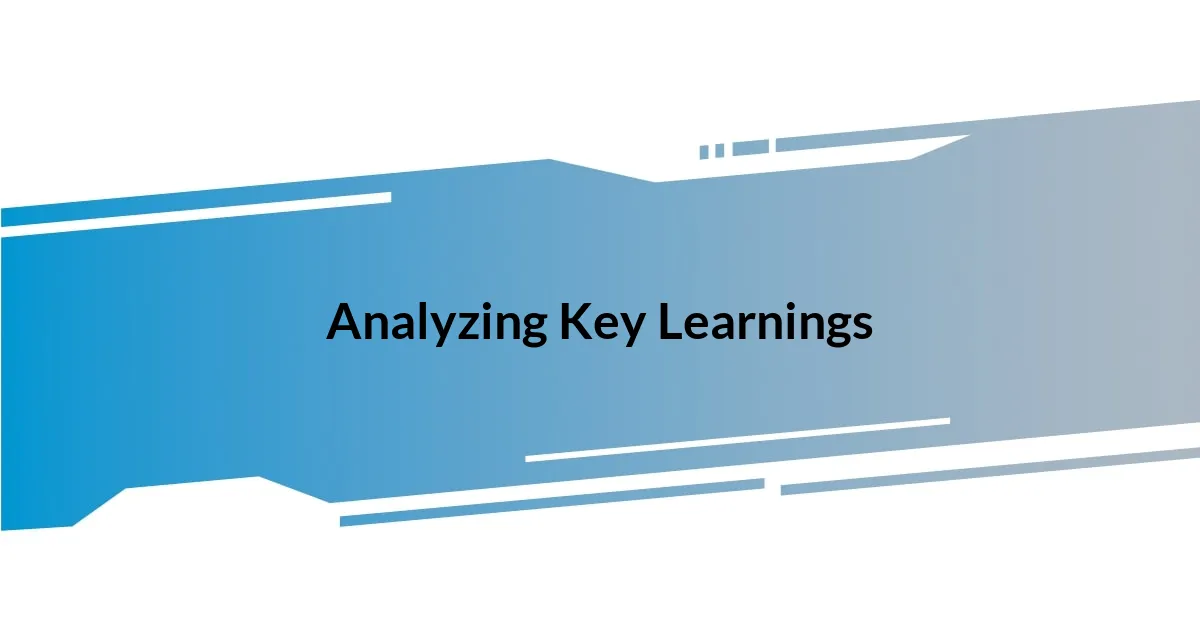
Analyzing Key Learnings
When analyzing key learnings from failed experiments, I often find myself reflecting on the emotions that accompany these setbacks. It’s like standing at a crossroads—do I linger in disappointment, or do I pivot toward growth? I’ll never forget the overwhelming mix of frustration and curiosity I felt after a project I poured my heart into collapsed. It was in that moment of vulnerability that I acknowledged the importance of embracing discomfort and using it to fuel introspection.
To effectively analyze what went wrong, I developed a process that allows me to distill my experiences into actionable insights. Here’s what I focus on:
- Identifying Emotional Triggers: Understanding how frustration or excitement influences my decisions helps me approach future projects with clarity.
- Systematic Review: I create lists of what went well and what didn’t, which allows me to see patterns in my thinking and decision-making.
- Asking the Right Questions: Rather than fixating solely on the outcome, I question how varying elements impacted the results, especially the context of my choices.
- Feedback Loops: Engaging with peers to dissect the failure provides fresh perspectives, often leading to revelations that I alone might miss.
These practices have transformed my relationship with failure, and in doing so, have opened doors to unforeseen opportunities.
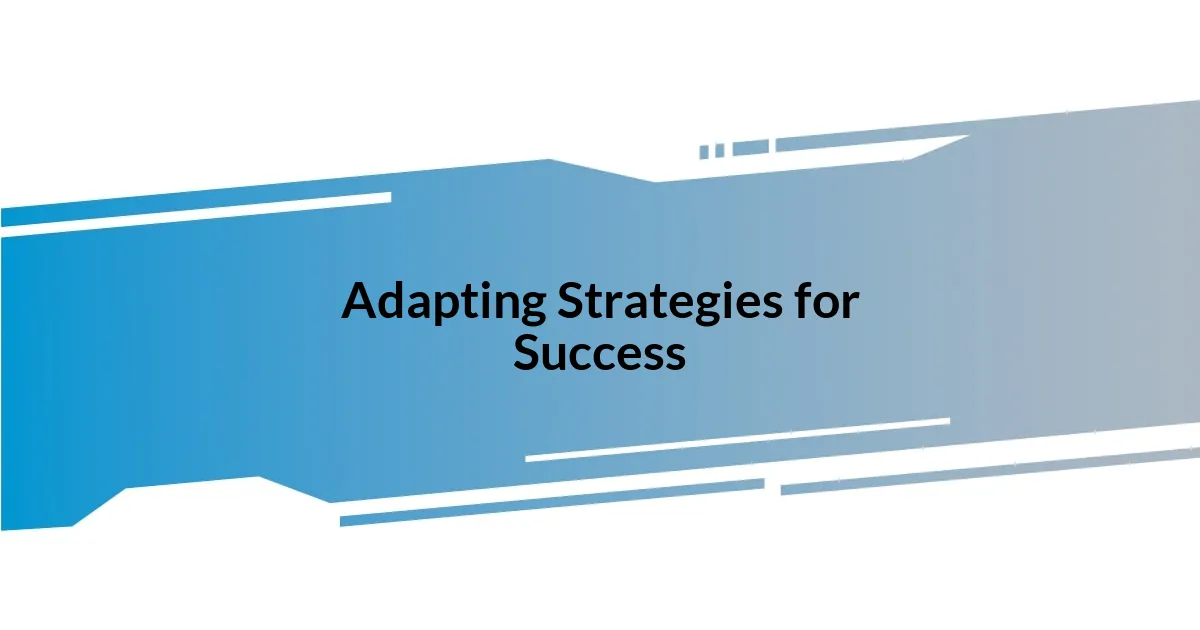
Adapting Strategies for Success
Adapting strategies is all about being nimble and receptive to feedback. I remember a time when I was so set on a specific methodology that I ignored the glaring discrepancies in my early results. Each setback was a wake-up call, urging me to rethink my approach. When I finally took a step back and allowed myself to consider alternative methods, I discovered that a simple tweak in my process led to a significant breakthrough. Have you ever felt that thrill when a small change drives big results?
Flexibility can be unsettling, but I’ve learned that it often breeds innovation. During one experiment, I found that my original hypothesis wasn’t supported by the data I collected. Instead of scrapping the entire project, I re-evaluated my data and let it guide me toward a new question. This shift not only salvaged my efforts but also introduced a whole new dimension to my research. It’s fascinating how following the data can lead to unexpected insights, isn’t it?
The key lies in fostering a mindset that embraces change. I often remind myself that failure isn’t the end; it’s merely a part of the journey. There was a pivotal moment when an unexpected obstacle made me consider collaboration, which I’d initially resisted. Partnering with others brought in fresh perspectives that reinvigorated my project, showing me that adapting my strategy to include teamwork could enhance outcomes significantly. So, how might you reframe setbacks as stepping stones for progress?
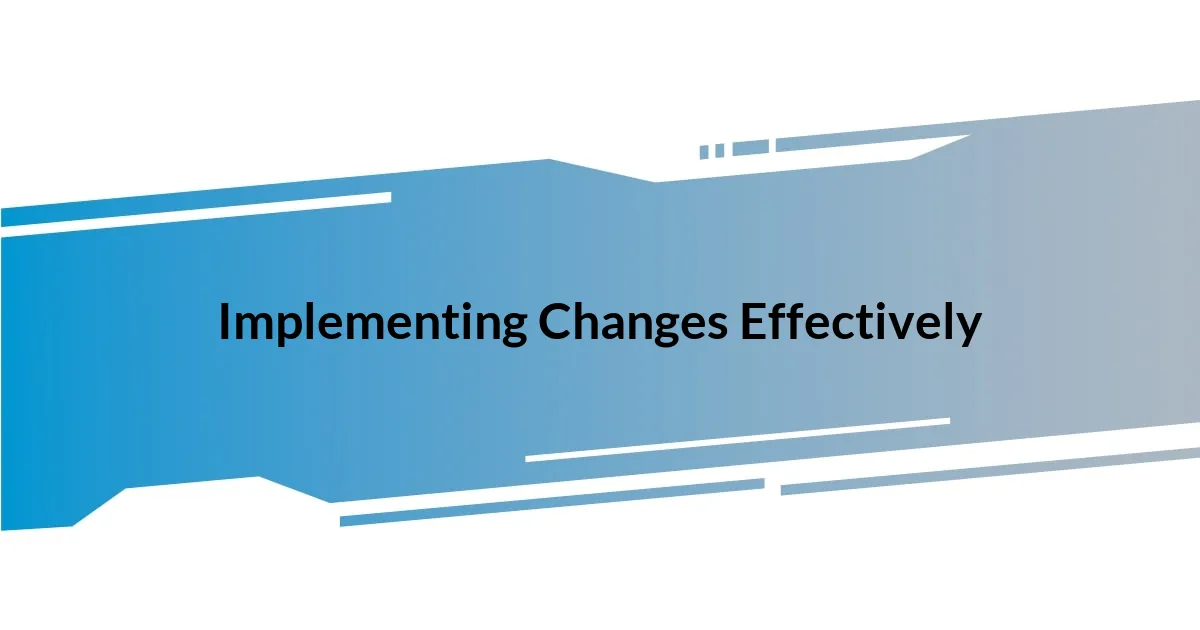
Implementing Changes Effectively
Implementing changes effectively often requires a delicate balance of trust and intuition. I recall a moment when I decided to overhaul an entire project after realizing my initial plan was flawed. It felt like standing on a tightrope—one misstep could send everything crashing down. But instead of panicking, I trusted my gut. I broke down the new strategy into manageable steps, allowing room for adjustments along the way. This approach not only eased my anxiety but also fostered an environment where I could learn continuously as I moved forward.
One vital aspect I’ve learned about making changes is the importance of communication. When I started involving my team more actively in decision-making, the shift was palpable. Initially, I was hesitant to share my ideas, fearing rejection. However, welcoming diverse opinions transformed the dialogue around the project. It was like opening a window on a stuffy day; fresh air revitalized our efforts, breathing new life into not only the project but also the camaraderie among us. Isn’t it incredible how collaboration can spark creativity?
Lastly, I’ve come to appreciate the role of resilience in implementing change. After a particularly challenging experiment that left me feeling defeated, I decided to journal my thoughts and strategies. This reflection became my safe space to process failed attempts while highlighting the small victories. I often ask myself, “What can I learn from this?” By treating each setback as a lesson, I’ve developed a resilient mindset that equips me to face future challenges with renewed vigor. The journey of change truly is a marathon, not a sprint, isn’t it?
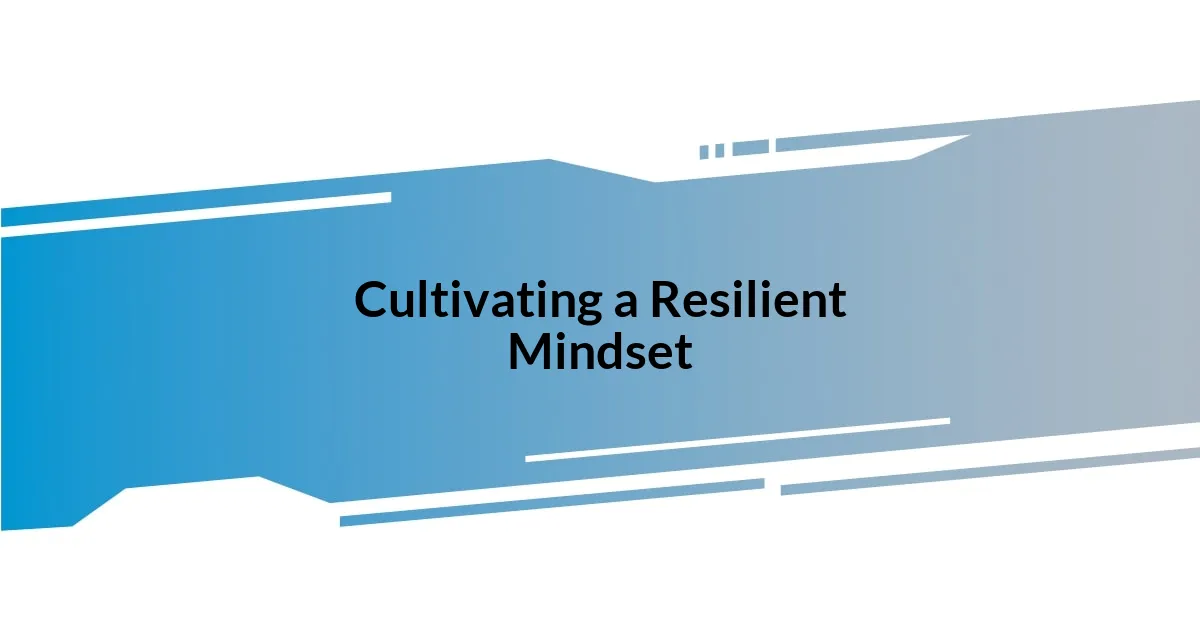
Cultivating a Resilient Mindset
Cultivating a resilient mindset is like building muscle; it requires regular practice and a willingness to face discomfort. I vividly recall a time when my experiments seemed to lead nowhere, and I felt utterly overwhelmed. In those moments, I learned to pause and reflect rather than spiral into self-doubt. I realized that vulnerability isn’t a weakness—it’s a stepping stone to growth. Have you ever found strength in your struggles?
Another key component of resilience is embracing uncertainty. During a particularly frustrating project, I spent countless hours trying to force a result that simply wasn’t materializing. It was only when I started to embrace the unknown that I unlocked new possibilities. I began to ask myself, “What if this failure is a blessing in disguise?” This perspective shift transformed my approach, allowing me to explore alternatives freely. Uncertainty can be daunting, but doesn’t it also hold the potential for unexpected breakthroughs?
Finally, I’ve learned that resilience thrives on meaningful connections. I remember confiding in a mentor during a tough phase in my research. Sharing my fears felt liberating, and the advice I received was invaluable. His encouragement to see obstacles as opportunities helped me revise my outlook. I often think about how powerful it can be to lean on others during challenging times. Isn’t it amazing how the right support can illuminate a path forward, even in the darkest moments?
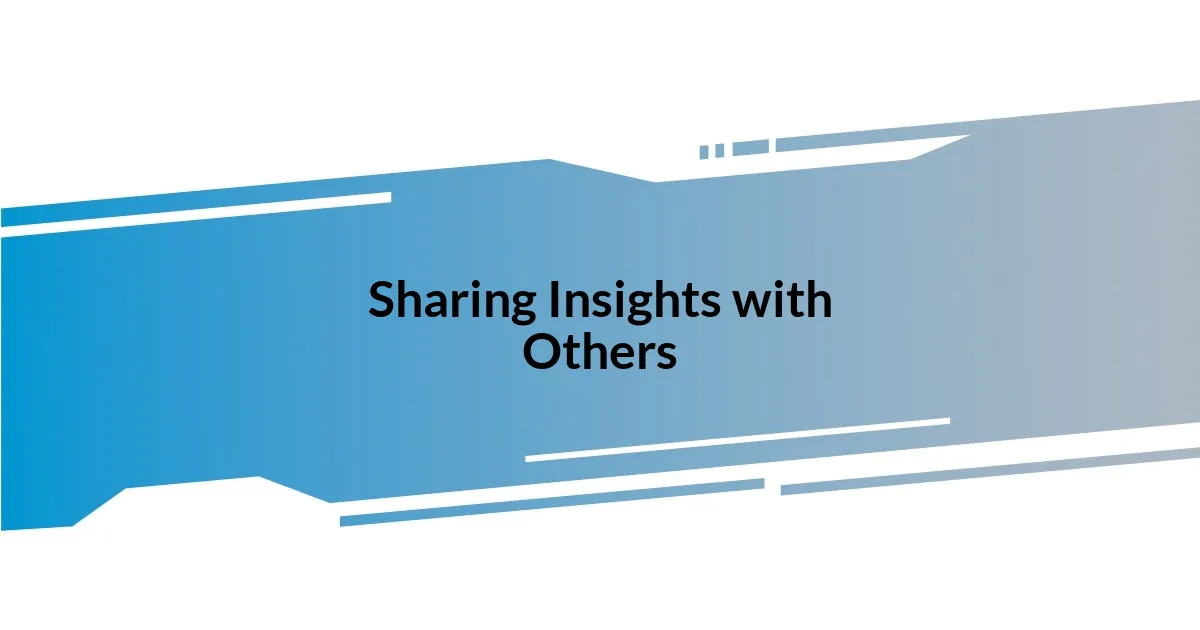
Sharing Insights with Others
Sharing insights from my failed experiments has been one of the most rewarding aspects of my journey. I remember vividly the first time I stood in front of a group to discuss a setback I’d experienced. As I spoke about my initial missteps, I noticed their expressions shift from curiosity to empathy. My vulnerability sparked a conversation where others began to share their stories of failure too. It made me realize how powerful it is to create an open forum for discussion; it was like lighting a candle in a dark room, illuminating shared experiences and lessons learned.
One incredible thing I’ve discovered is how sharing insights can foster a culture of learning. In my case, when I started documenting my challenges in a blog, I received countless messages from readers who felt inspired to share their insights in return. It became a chain reaction—my struggles resonated with others, and their reflections enriched my understanding. Can you imagine the magic that happens when we collectively dissect our experiences? It’s like creating a tapestry that weaves together different threads of wisdom, painting a richer picture of our collective knowledge.
I often think about the mentors I’ve encountered along my path, and how their willingness to share their missteps changed everything for me. I vividly recall a conversation over coffee where one mentor revealed a massive flop from his early career. Instead of making me feel discouraged, it filled me with hope and encouraged me to approach my own challenges differently. The realization that even the most successful individuals have faced hurdles made me feel less isolated in my journey. Isn’t it comforting to know that we all stumble, yet we can still rise stronger together?